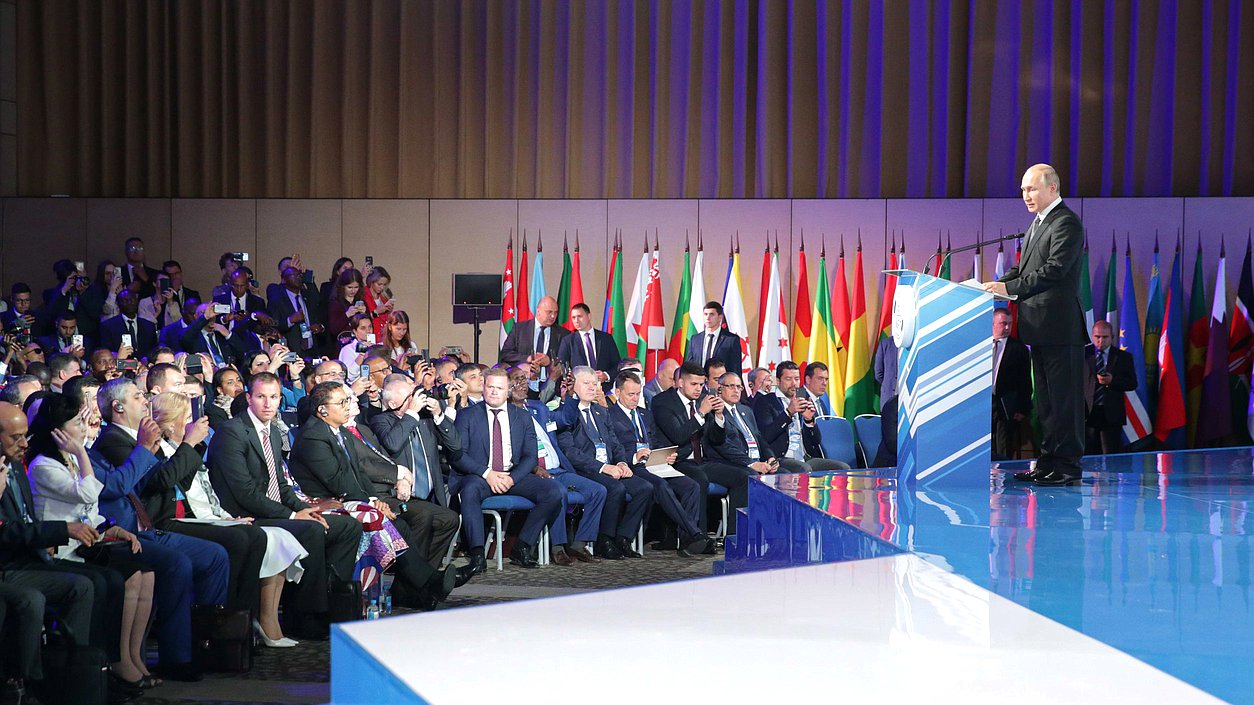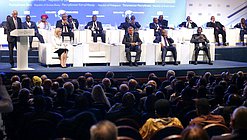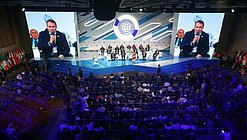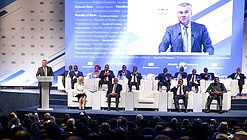
The final plenary session of the Second International Forum “Development of Parliamentarism” was held on July 3 in Moscow and President Vladimir Putin took part in it.
Addressing the participants of the Forum, the President emphasized that “the modern world needs an open and free exchange of views, confidence building and search for mutual understanding.”
“Your Forum is being held for the second time and has already demonstrated its relevance and importance, the urgent relevance and importance of inter-parliamentary interaction and dialogue. The modern world so urgently needs such extensive cooperation, open and free exchange of views, confidence building and the search for mutual understanding,” said Vladimir Putin.
The President of the Russian Federation also noted that “a substantive, trusting dialogue, exchange of legislative practices, discussion of issues of improvement and development of the system of international law can take place only in a healthy, strong inter-parliamentary environment”.
“Your Forum fully meets these requirements,” said Vladimir Putin. He noted that the thematic accents, which were outlined on the Forum’s agenda, as well as at the recently held G20 summit in Osaka and voiced during the discussions at the St. Petersburg Economic Forum, “fit together and complement each other in many respects.”
He thanked the participants of the Forum that they “considered it important and necessary to come to this Forum, and discuss multifaceted issues of inter-parliamentary cooperation on basis of trust and constructive approaches.”
“Such a respectful, fruitful interaction makes a significant contribution to strengthening the true partnership between our countries and nations,” he concluded.
Earlier, representatives of the countries participating in the Forum have held discussions at the round tables and sections, as well as in the events of the Parliamentary Conference “Russia-Africa” held on the eve of a landmark event in Russian-African relations. Russia-Africa summit will take place in Sochi on October 24 this year; the summit was announced by Russian President Vladimir Putin.
The Second International Forum ”Development of Parliamentarism“ was held on July 1–3 on the initiative of the State Duma. This year, representatives from 132 states came to the Forum. About 800 experts and parliamentarians, including 14 international parliamentary organizations, and 41 speakers representing the national parliaments have taken part in the events.
This is twice the number of the Forum 2018: 19 speakers of parliaments took part in the Forum last year.
The Forum Declaration was adopted the day before. The Forum participants declared the unacceptability of sanctions and supported equal dialogue and cooperation.
Overcoming international isolation
The President of the Parliament of the Republic of Moldova Zinaida Greceanîi, speaking at the final plenary session, noted that Moldova “has overcome the period of international isolation.”
“Moldova presented to the world a unique example of the convergence of interests and cooperation of large geopolitical and regional players for the benefit and development of a single country. Our experience shows that in modern world, in modern global power structure, there is a place for dialogue, consensus and progress, even for representatives having traditionally different political views,” she stressed.
She also emphasized that the Moldovan parliamentarians “have a chance to restore in full Russian-Moldovan cooperation and relations with our other partners.”
See also
“In our time of intensive international contacts and the development of global society, it is difficult to overestimate the importance of inter-parliamentary cooperation. It is very important that the elected authorities should act in the interests of the people, create the necessary regulatory framework for the protection of human rights, and counter corruption, develop and improve multiparty systems. Together we can find solutions to the challenges facing our countries. Inter-parliamentary cooperation, I believe, has a wide remit. This includes economy, social and humanitarian spheres, demography, ecology, culture and, last but not least, corruption control, transcending national borders,” said Zinaida Greceanîi.
She also thanked “the leadership of the Russian Federation and Viacheslav Volodin, who was the first to officially support the new parliamentary majority” in Moldova.
“Today Moldova is writing a new page of its history. (…) It is in our common power and interests to take the interaction between the parliamentarians of our countries to a decent level and give it specific content,” concluded Zinaida Greceanîi.
Take a proactive approach
“We all should address the challenges of our time, and the time for inter-parliamentary diplomacy has come,” said Speaker of the National Assembly of the Republic of Zambia Patrick Matibini. The Forum will serve as a platform for exchange of experience and interaction, as he noted. “I believe that parliamentarians will work actively on it, and they will be able to do a lot to preserve peace and resolve conflicts by diplomatic and political methods,” said Patrick Matibini.
“We live in a rapidly changing world, and I believe that legislators have a special role – they should take a proactive approach when responding to various international events,” he stressed.
Non-interference in the sovereign affairs of other states
President of the National Assembly of the Republic of the Congo Isidore Mvouba stressed that “the world is facing challenges like terrorism, climate changes, corruption, and slavery. Therefore, it is important to establish cooperation between states without interfering in the sovereign affairs of other states to overcome them.”
In his statement, he also focused on the need to enhance cooperation between Russia and Africa, stressing that “Russia can play a major role in the development of the African continent, as it is a fraternal country.”
Isidore Mvouba in his speech also reminded about the recent visit of the President of the Republic of the Congo Denis Sassou Nguess, who has done a lot for development of cooperation between Russia and the Republic of the Congo.
Serbia stands for peace without sanctions
Deputy Speaker of the National Assembly of the Republic of Serbia, Djordje Milicevic, congratulated the Russian side for the excellent organization of the Forum, and also noted the importance of the topics and the professionalism of the speakers.
According to him, the parliamentarians’ task is to search for answers to existing and future challenges.
“In order to preserve peace and international security Serbia has consistently supported the adherence to international law, as well as the realization of the principle of equal cooperation without using sanctions as an instrument of coercion,” stated the Deputy Speaker of the National Assembly of Serbia.
“In this regard, I would like to emphasize that Serbia will never impose sanctions against the Russian Federation,” said Djordje Milicevi.
Cuba against new ”masters of the world“
Vice President of the National Assembly of People's Power of the Republic of Cuba Ana María Mari Machado reminded the participants of the plenary session of the International Forum “Development of Parliamentarism” of the problems and challenges that her country is facing.
The United States has been trying for decades to turn Cuba ”into its own province and destroy our industry.“ Ana María Mari Machado thanked Russia and the State Duma for the support providing to the Republic of Cuba.
“The strongest states in the Western Hemisphere violate the principles and the UN Charter. They are driven by greed and avarice. Those states that do not want to become slaves of imperialism, who defend their political, economic, social system to bring justice and achieve development, are threatened,” said Ana María Mari Machado.
“Let’s look for ways of sustainable development and restrain the attacks of those who consider themselves masters of the world,” urged the Vice President of the National Assembly of People's Power of the Republic of Cuba.
Strengthening of stability and peace
Vice President of the Council of State of the Sultanate of Oman Mohammed Abu-Bakar Al-Ghassani noted the growing influence of parliaments on public and political life.
“Responsibility in lawmaking process is increasing. It should be aimed at increasing attention to the person, solving universal human problems,” he said.
Mohammed Abu-Bakar Al-Ghassani stressed that “nationals need us to find ways to resolve conflicts peacefully.”
“In order not to use violence to resolve the contradictions arising between us, our parliaments should consider such laws that promote the peaceful resolution of conflicts, which would be characterized by the development of mutual indulgence and tolerance. Our parliaments should close the channels to any fake news, should prevent any attempts to promote injustice, oppression, nationalism. (…) We should do everything to instill values of mutual respect so that it will contribute to the strengthening of stability and peace,” he concluded.
Tanzania is ready for further cooperation
Tulia M. Jackson, Deputy Speaker of the National Assembly of the United Republic of Tanzania, noted that during the days of the Forum, she had the opportunity to listen to many speakers.
“We are very grateful for the relations that Russia has established with our country. They get a new status. This includes parliamentary relations as well. Today the Parliament of Tanzania is ready to work with the Russian parliament,” she said.
Tulia M. Jackson also made a number of proposals for the future work of the Forum.



